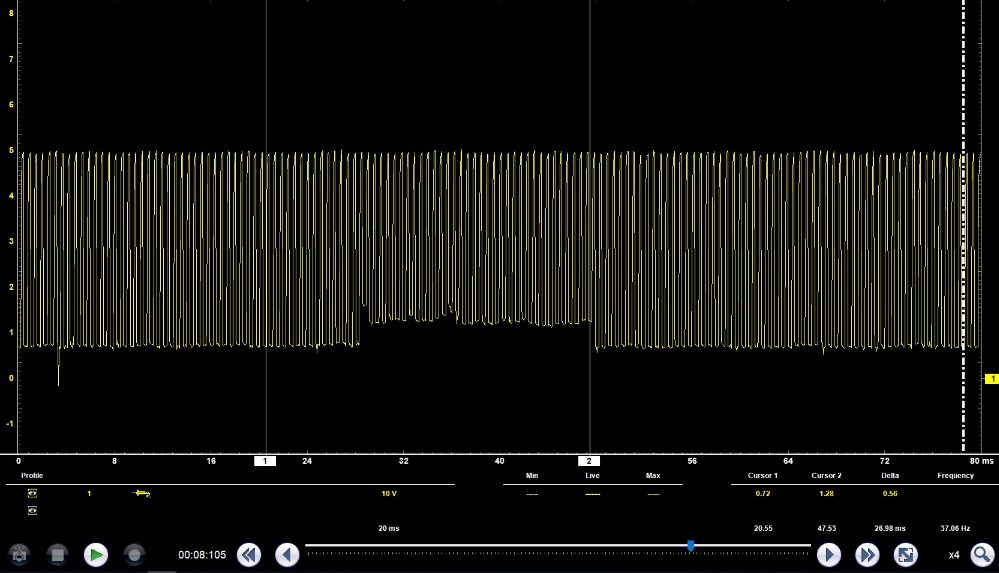*** Restricting New Posts to SD Premium Members ONLY *** (09 May 2025)
Just made a new account? Can't post? Click above.
PWM Signals.
- SeaBass
-
Topic Author
- Offline
- New Member
-

- Premium member.
Less
More
- Posts: 9
- Thank you received: 1
6 years 3 months ago - 6 years 3 months ago #30444
by SeaBass
PWM Signals. was created by SeaBass
What would a bad PWM signal look like? Would it be missing a cycle, would the amplitude of one of the signals/cycles be lower than the other or would the edges just be ragged and not sharp and straight or a little bit of all? The only thing that I can find on PWM is explanations for what it is but cannot find an example of bad signals created by bad parts. Just started Pauls course on his premium site so I have not crossed that yet. So much to learn, but its fun.
Last edit: 6 years 3 months ago by SeaBass.
Please Log in or Create an account to join the conversation.
- Tyler
-

- Offline
- Moderator
-

- Full time HACK since 2012
Less
More
- Posts: 6039
- Thank you received: 1518
6 years 3 months ago #30445
by Tyler
Replied by Tyler on topic PWM Signals.
By PWM signals, are you referring to sensors and input signals? Or about PWM control of an output?
Here's a quick example of a sensor signal issue. This was taken from an F-150 with an output shaft speed sensor code stored. Caught it on a test drive. It's a pull down circuit, and occasionally the sensor would fail to pull the circuit all the way down.
I find that all types of Hall effect sensors are prone to this kind of failure, and it's not always easy to catch. :silly:
Here's a quick example of a sensor signal issue. This was taken from an F-150 with an output shaft speed sensor code stored. Caught it on a test drive. It's a pull down circuit, and occasionally the sensor would fail to pull the circuit all the way down.
I find that all types of Hall effect sensors are prone to this kind of failure, and it's not always easy to catch. :silly:
Please Log in or Create an account to join the conversation.
- SeaBass
-
Topic Author
- Offline
- New Member
-

- Premium member.
Less
More
- Posts: 9
- Thank you received: 1
6 years 3 months ago #30485
by SeaBass
Replied by SeaBass on topic PWM Signals.
As you can tell I am pretty darn ignorant about this stuff, this is totally new to me. I am curious about both, you summed it up better than I did! And I may be off base here, I was wondering about a bad sensor input signal, and also if I were testing a component, like a motor, how would the PWM signal look if the motor has a problem, lets say a cooling fan or fuel pump motor. I do understand that an oscilloscope would be much better for this, but could/would a PWM signal indicate a glitch? I am trying learn as much as I can, about as much as I can:) before I purchase an oscilloscope. This way I am not totally in the dark. I do watch Paul's videos and I purchased his book and am following along in his course, Absolutely excellent, one of the best discoveries that I have ever made . I watch videos, Pico, TST, Motorage and Eric O's at South Main Auto. However the PWM some what puzzles me. I do understand the duty cycle%, I do understand pull up and pull down circuits and how to identify them on schematics. I hope I gave you enough info this time! When I was a kid, my dad nicknamed me "the kid with 10,000 questions." And at 63 I have not changed. Learning is challenging the brain, better than watching the news. I am not totally ignorant about automotive electronics. But the depth of the subject matter is fascinating to me. My wife calls me an information sponge. I am lucky I still have her, the choice was between my figure 8 car and her, she is still here, its gone. To much time in the garage and not with her. That went on for years, her patience ran out. Now I do project cars, keeps her happy, keeps me busy. Anyway, I apologize if I am being a pest. I know your busy, take your time if you chose to answer, but any input would provide me with avenues in which I could do further research. Thank you, and thanks for the picture.
Please Log in or Create an account to join the conversation.
- SeaBass
-
Topic Author
- Offline
- New Member
-

- Premium member.
Less
More
- Posts: 9
- Thank you received: 1
6 years 3 months ago #30487
by SeaBass
Replied by SeaBass on topic PWM Signals.
Thanks to your picture that you sent me and some researching this morning I have discovered the answer to my question about sensors and PWM. WOW! Thanks. I just was not typing in the proper key words, you really helped me out! I found some really interesting PDF's on the Motor.com site. One really good article about crankshaft position sensors and PWM. So, would solenoids and motors show a missing signal or a high voltage or poor ground, say 1,2 or 3 volts instead of 0 at ground if they were bad?
Please Log in or Create an account to join the conversation.
Time to create page: 0.396 seconds

